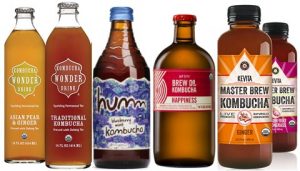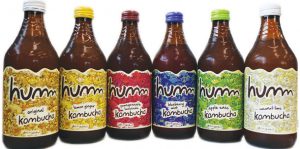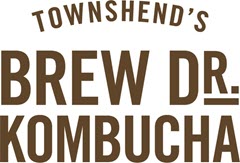

 As interest in fermented food products gains momentum, companies such as Brew Dr Kombucha, KeVita, humm kombucha, Wild Kombucha and the U.S.’s first commercial kombucha brewer GT Dave (aka GT’s Living Foods) are reporting encouraging sales and widened national distribution. Sales of market leader GT’s reached $100 million last year, according to IRI stats for the refrigerated (RFG) teas category.
Brew Dr. Kombucha rose quickly from a small Oregon-based organic kombucha brewer in 2008, to being the third largest natural kombucha company in 2013, $11 million in sales in 2016, and North American distribution that includes Costco, Target, Kroger and Safeway. PepsiCo’s 2016 acquisition of kombucha brand KeVita ($42 million in sales in 2017, according to the IRI report) highlights the potential of kombucha in the U.S. And 2017 saw Berkeley, California-based Peet’s Coffee invest $7.5 million in craft kombucha brewer Revive Kombucha, which started out at a farmer’s market stall at the Sonoma County Farmer’s Market just seven years ago in 2010.
“With continued 30 percent growth in the natural channel and 50 percent growth (or more) in the conventional channel year after year, kombucha is the fastest growing functional beverage category,” according to Kombucha Brewers International, an organization that represents more than 50 commercial kombucha brewers.
FoodNavigator-USA lists probiotics as one of its “top 10 food and beverage trends to watch in 2018” and lists kombucha alongside yogurt, kefir, sauerkraut, tempeh, kimchi and miso as the most likely to succeed.
“Whether people gravitate toward the fermented, fizzy stuff for the taste or for the gut health, the category is more desirable than ever,” writes wellandgood.com. “Expect to see kombucha’s probiotic presence permeating your grocery store fridge aisle.”
Errol Schweizer, executive global grocery coordinator for Whole Foods Market, was quoted in a recent Forbes.com story as noting that kombucha occupies up to one-third of refrigerated functional-beverage shelf space in Whole Foods stores.
Kombucha is considered the fastest-growing product in the functional beverage market with sales estimates of $1.8 billion by 2020, according to Forbes.com. Domestic kombucha sales have a combined annual growth rate (CAGR) of 25 percent between 2015 to 2020, it reports.
Industry expert Hannah Crum, co-founder of Kombucha Brewers International, sees the popularity of kombucha as mirroring the arc of yogurt. “In our parents' generation, you had to make your own yogurt because it wasn't a commercial product, but then people heard the health benefits and how it could extend your life and then it became a multi-million dollar industry. We think people in the future will grow up just accepting kombucha as a product they had as a kid.”
As interest in fermented food products gains momentum, companies such as Brew Dr Kombucha, KeVita, humm kombucha, Wild Kombucha and the U.S.’s first commercial kombucha brewer GT Dave (aka GT’s Living Foods) are reporting encouraging sales and widened national distribution. Sales of market leader GT’s reached $100 million last year, according to IRI stats for the refrigerated (RFG) teas category.
Brew Dr. Kombucha rose quickly from a small Oregon-based organic kombucha brewer in 2008, to being the third largest natural kombucha company in 2013, $11 million in sales in 2016, and North American distribution that includes Costco, Target, Kroger and Safeway. PepsiCo’s 2016 acquisition of kombucha brand KeVita ($42 million in sales in 2017, according to the IRI report) highlights the potential of kombucha in the U.S. And 2017 saw Berkeley, California-based Peet’s Coffee invest $7.5 million in craft kombucha brewer Revive Kombucha, which started out at a farmer’s market stall at the Sonoma County Farmer’s Market just seven years ago in 2010.
“With continued 30 percent growth in the natural channel and 50 percent growth (or more) in the conventional channel year after year, kombucha is the fastest growing functional beverage category,” according to Kombucha Brewers International, an organization that represents more than 50 commercial kombucha brewers.
FoodNavigator-USA lists probiotics as one of its “top 10 food and beverage trends to watch in 2018” and lists kombucha alongside yogurt, kefir, sauerkraut, tempeh, kimchi and miso as the most likely to succeed.
“Whether people gravitate toward the fermented, fizzy stuff for the taste or for the gut health, the category is more desirable than ever,” writes wellandgood.com. “Expect to see kombucha’s probiotic presence permeating your grocery store fridge aisle.”
Errol Schweizer, executive global grocery coordinator for Whole Foods Market, was quoted in a recent Forbes.com story as noting that kombucha occupies up to one-third of refrigerated functional-beverage shelf space in Whole Foods stores.
Kombucha is considered the fastest-growing product in the functional beverage market with sales estimates of $1.8 billion by 2020, according to Forbes.com. Domestic kombucha sales have a combined annual growth rate (CAGR) of 25 percent between 2015 to 2020, it reports.
Industry expert Hannah Crum, co-founder of Kombucha Brewers International, sees the popularity of kombucha as mirroring the arc of yogurt. “In our parents' generation, you had to make your own yogurt because it wasn't a commercial product, but then people heard the health benefits and how it could extend your life and then it became a multi-million dollar industry. We think people in the future will grow up just accepting kombucha as a product they had as a kid.”
